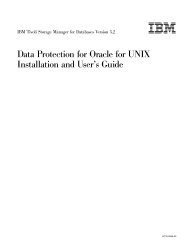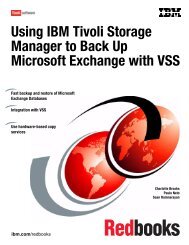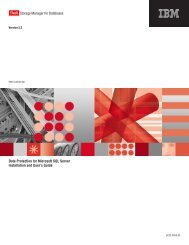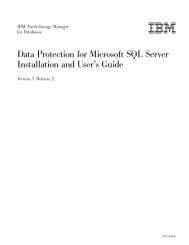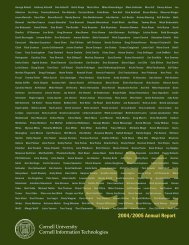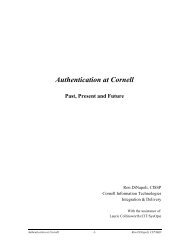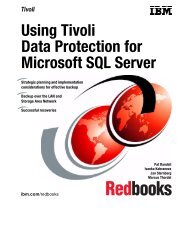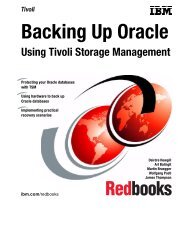Installation and User's Guide - Services and Support
Installation and User's Guide - Services and Support
Installation and User's Guide - Services and Support
You also want an ePaper? Increase the reach of your titles
YUMPU automatically turns print PDFs into web optimized ePapers that Google loves.
IBM Confidentialinstance to a different log file <strong>and</strong> prevents interspersed log file records.Failure to specify a different log file for each instance can result inunreadable log files./LOGPrune=numdays|NoUse the /logprune parameter to disable log pruning or to explicitly requesta prune of the log for one comm<strong>and</strong> run. By default, log pruning isenabled <strong>and</strong> performed once per day. The numdays variable represents thenumber of days to save log entries. By default, 60 days of log entries aresaved in the prune process. You can use the Data Protection for ExchangeGUI or the set comm<strong>and</strong> to change the defaults so that log pruning isdisabled, or so that more or less days of log entries are saved. Thecomm<strong>and</strong> line user may use the /logprune parameter to override thesedefaults for one comm<strong>and</strong> run. Note that when the value of the /logprunevariable numdays is a number in the range 0 to 9999, a prune is performedeven if one has already been performed for the day.Changes to the value of the timeformat or dateformat parameter can resultin an undesired pruning of the Data Protection for Exchange log file. If youare running a comm<strong>and</strong> that may prune the log file <strong>and</strong> the value of thetimeformat or dateformat parameter has changed, perform one of thefollowing to prevent undesired pruning of the log file:v Make a copy of the existing log file.v Specify a new log file with the /logfile parameter or logfile setting./TSMNODe=tsmnodenameThe tsmnodename variable refers to the Tivoli Storage Manager node nameData Protection for Exchange uses to log on to the Tivoli Storage Managerserver. You can also store the node name in the Tivoli Storage Manageroptions file. The comm<strong>and</strong> line parameter overrides the value in the TivoliStorage Manager options file if PASSWORDACCESS is set to PROMPT.This parameter is not valid when PASSWORDACCESS is set toGENERATE./TSMOPTFile=tsmoptfilenameThe tsmoptfilename variable identifies the Data Protection for Exchangeoptions file.The file name can include a fully qualified path name. If no path isspecified, the directory where Data Protection for Exchange is installed issearched.If the tsmoptfilename variable includes spaces, the entire /tsmoptfileparameter entry must be placed in double quotes. For example:/TSMOPTFile="c:\Program Files\file.opt"The default is dsm.opt./TSMPassword=tsmpasswordThe tsmpassword variable refers to the Tivoli Storage Manager passwordData Protection for Exchange uses to log on to the Tivoli Storage Managerserver. If you specified PASSWORDACCESS GENERATE in the DataProtection for Exchange options file, then the password need not beprovided here because the one stored in the registry is used. However, inorder to store the password in the registry, you must specify the TivoliStorage Manager password the first time Data Protection for Exchangeconnects to the Tivoli Storage Manager server.Chapter 5. Using the Comm<strong>and</strong> Line Interface 73




